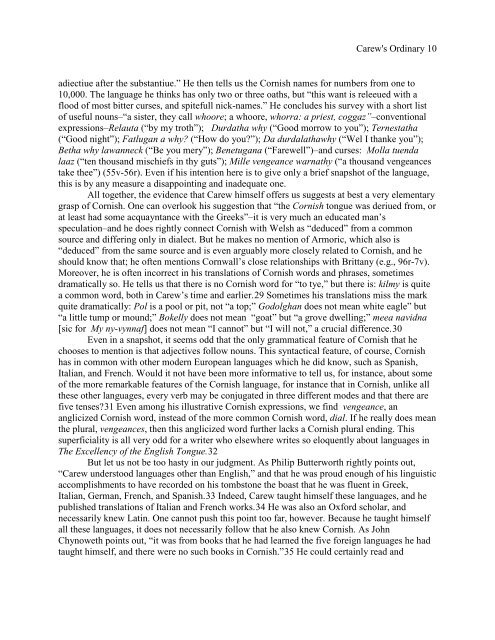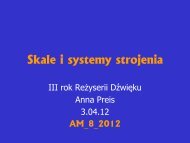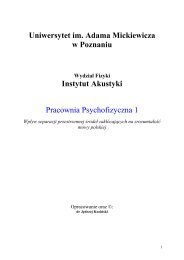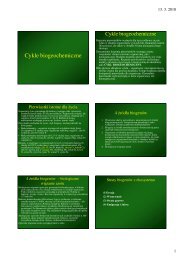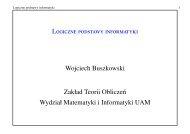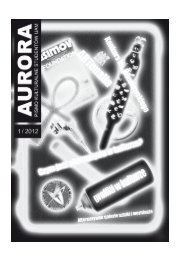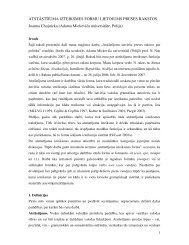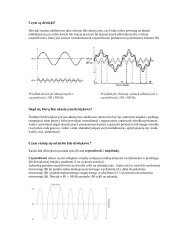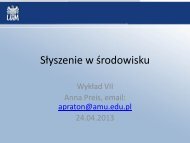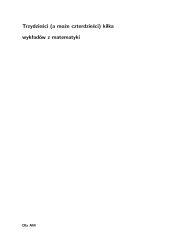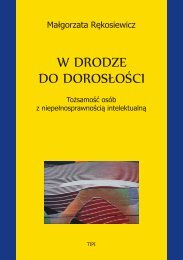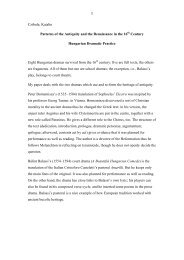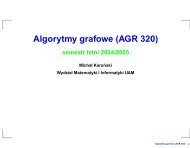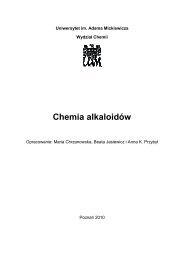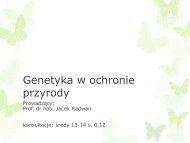Richard Carew. The Ordinary, The Ordinalia, and the Ordinary Actor ...
Richard Carew. The Ordinary, The Ordinalia, and the Ordinary Actor ...
Richard Carew. The Ordinary, The Ordinalia, and the Ordinary Actor ...
You also want an ePaper? Increase the reach of your titles
YUMPU automatically turns print PDFs into web optimized ePapers that Google loves.
<strong>Carew</strong>'s <strong>Ordinary</strong> 10<br />
adiectiue after <strong>the</strong> substantiue.” He <strong>the</strong>n tells us <strong>the</strong> Cornish names for numbers from one to<br />
10,000. <strong>The</strong> language he thinks has only two or three oaths, but “this want is releeued with a<br />
flood of most bitter curses, <strong>and</strong> spitefull nick-names.” He concludes his survey with a short list<br />
of useful nouns–“a sister, <strong>the</strong>y call whoore; a whoore, whorra: a priest, coggaz”–conventional<br />
expressions–Relauta (“by my troth”); Durdatha why (“Good morrow to you”); Ternestatha<br />
(“Good night”); Fatlugan a why? (“How do you?”); Da durdalathawhy (“Wel I thanke you”);<br />
Betha why lawanneck (“Be you mery”); Benetugana (“Farewell”)–<strong>and</strong> curses: Molla tuenda<br />
laaz (“ten thous<strong>and</strong> mischiefs in thy guts”); Mille vengeance warnathy (“a thous<strong>and</strong> vengeances<br />
take <strong>the</strong>e”) (55v-56r). Even if his intention here is to give only a brief snapshot of <strong>the</strong> language,<br />
this is by any measure a disappointing <strong>and</strong> inadequate one.<br />
All toge<strong>the</strong>r, <strong>the</strong> evidence that <strong>Carew</strong> himself offers us suggests at best a very elementary<br />
grasp of Cornish. One can overlook his suggestion that “<strong>the</strong> Cornish tongue was deriued from, or<br />
at least had some acquayntance with <strong>the</strong> Greeks”–it is very much an educated man’s<br />
speculation–<strong>and</strong> he does rightly connect Cornish with Welsh as “deduced” from a common<br />
source <strong>and</strong> differing only in dialect. But he makes no mention of Armoric, which also is<br />
“deduced” from <strong>the</strong> same source <strong>and</strong> is even arguably more closely related to Cornish, <strong>and</strong> he<br />
should know that; he often mentions Cornwall’s close relationships with Brittany (e.g., 96r-7v).<br />
Moreover, he is often incorrect in his translations of Cornish words <strong>and</strong> phrases, sometimes<br />
dramatically so. He tells us that <strong>the</strong>re is no Cornish word for “to tye,” but <strong>the</strong>re is: kilmy is quite<br />
a common word, both in <strong>Carew</strong>’s time <strong>and</strong> earlier.29 Sometimes his translations miss <strong>the</strong> mark<br />
quite dramatically: Pol is a pool or pit, not “a top;” Godolghan does not mean white eagle” but<br />
“a little tump or mound;” Bokelly does not mean “goat” but “a grove dwelling;” meea navidna<br />
[sic for My ny-vynnaf] does not mean “I cannot” but “I will not,” a crucial difference.30<br />
Even in a snapshot, it seems odd that <strong>the</strong> only grammatical feature of Cornish that he<br />
chooses to mention is that adjectives follow nouns. This syntactical feature, of course, Cornish<br />
has in common with o<strong>the</strong>r modern European languages which he did know, such as Spanish,<br />
Italian, <strong>and</strong> French. Would it not have been more informative to tell us, for instance, about some<br />
of <strong>the</strong> more remarkable features of <strong>the</strong> Cornish language, for instance that in Cornish, unlike all<br />
<strong>the</strong>se o<strong>the</strong>r languages, every verb may be conjugated in three different modes <strong>and</strong> that <strong>the</strong>re are<br />
five tenses?31 Even among his illustrative Cornish expressions, we find vengeance, an<br />
anglicized Cornish word, instead of <strong>the</strong> more common Cornish word, dial. If he really does mean<br />
<strong>the</strong> plural, vengeances, <strong>the</strong>n this anglicized word fur<strong>the</strong>r lacks a Cornish plural ending. This<br />
superficiality is all very odd for a writer who elsewhere writes so eloquently about languages in<br />
<strong>The</strong> Excellency of <strong>the</strong> English Tongue.32<br />
But let us not be too hasty in our judgment. As Philip Butterworth rightly points out,<br />
“<strong>Carew</strong> understood languages o<strong>the</strong>r than English,” <strong>and</strong> that he was proud enough of his linguistic<br />
accomplishments to have recorded on his tombstone <strong>the</strong> boast that he was fluent in Greek,<br />
Italian, German, French, <strong>and</strong> Spanish.33 Indeed, <strong>Carew</strong> taught himself <strong>the</strong>se languages, <strong>and</strong> he<br />
published translations of Italian <strong>and</strong> French works.34 He was also an Oxford scholar, <strong>and</strong><br />
necessarily knew Latin. One cannot push this point too far, however. Because he taught himself<br />
all <strong>the</strong>se languages, it does not necessarily follow that he also knew Cornish. As John<br />
Chynoweth points out, “it was from books that he had learned <strong>the</strong> five foreign languages he had<br />
taught himself, <strong>and</strong> <strong>the</strong>re were no such books in Cornish.”35 He could certainly read <strong>and</strong>


